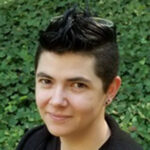Summer 2022
3
What the Story Wants: An Interview with Jasminne Mendez
Keats Chaves, Contributing Writer (Class of 2022)
What the Story Wants:
An Interview with Jasminne Mendez

Keats Chaves
Contributing Writer
Class of 2022
Just a couple weeks ago, in May 2022, RWW alum Jasminne Mendez’s (2019) first ever play, City Without Altar, debuted in Portland, Oregon, at the Milagro Theatre. Jasminne is a Dominican-American poet, educator, translator, playwright, and award-winning author of several books for children and adults. In addition to having poetry and essays published in numerous journals and anthologies, Jasminne is the author of two multi-genre collections: Island of Dreams (Floricanto Press), and Night-Blooming Jasmin(n)e: Personal Essays and Poetry (Arte Publico Press), and her debut poetry collection City Without Altar was a finalist for the Noemi Press poetry prize and will be released in August 2022 by Noemi Press. Currently, Jasminne is the Program Director for the literary arts non-profit Tintero Projects and teaches creative writing for Goddard College.
While I’m disappointed that I wasn’t able to see City Without Altar, luckily for me, I have since had the opportunity to ask Jasminne a few questions. I am happy to be sharing that conversation with you now.
Keats Chaves: You write in multiple literary genres (poetry, prose, and now—officially!—drama). Is there a genre that you prefer over the others, or find more fun/interesting to write? Is there one that’s more challenging for you?
Jasminne Mendez: Overall, I just consider myself a storyteller and don’t necessarily think too hard about genre at first. Rather, I think about what story I need to write/tell (sometimes that’s a narrative story, sometimes it’s an emotional or meditative one), and while I may begin telling that story in one genre, I may realize the story is actually seeking to be told in a different genre. Which is why I end up writing hybrid works such as a play or novel in verse, or a creative nonfiction/hybrid memoir with poems, essays, and even images. I can’t say that I “prefer” one genre over the other—it really just depends on the story I’m trying to tell and what the story wants. Lately I’ve really been enjoying novels in verse and writing stories through persona poems and narrative pieces. I think the most challenging one for me right now is playwriting because it’s still such a new genre for me and I’m learning a lot as I go.

KC: City Without Altar is your first full-length play—can you tell us a little about your process for writing it?
JM: City Without Altar is actually an adapted version of my Rainier Writing Workshop creative thesis manuscript, which began as a collection of persona poems amplifying the voices of the 1937 Haitian Massacre (also known as The Parsley Massacre) along the northwestern border of the Dominican Republic and Haiti. I spent years researching the massacre, reading transcripts and interviews, reading books, talking to family members, and visiting the Dominican Republic. I began this work as an exercise in docu-poetics, and, eventually, I really began to enjoy crafting persona poems in the voices of the victims and survivors of the massacre. Once, at a poetry reading, I read one of the persona poems and a friend (who knew I had studied theatre in the past) suggested it might make an interesting play. I remembered one of my favorite plays of all time was written as a choreopoem (For Colored Girls Who Have Considered Suicide When the Rainbow is Enuf), and decided to give it a shot. After MULTIPLE revisions, three staged readings, and now one full production, I think I’m FINALLY finished with it, but who knows! Even though I spent my whole life in the theatre, this was my first time in the playwright’s seat, and it was scary, hard, thrilling, and humbling. Writing has always been such a solitary act for me in the drafting and revising phases, so for it to be more of a collaborative exercise was very challenging for me. But the reward of seeing and hearing the final production live on stage is something I don’t think can be replicated in any other genre.
“. . . the reward of seeing and hearing the final production live on stage is something I don’t think can be replicated in any other genre.”
KC: Do you have any advice for someone wanting to branch out into drama/playwriting from poetry or prose?
JM: I think the best advice I can give is the advice Barrie Jean Borich gave me when I was struggling my first semester to write creative nonfiction, and that is: “You don’t have to give up being a poet to be an essayist.” And you can change that to anything: you don’t have to give up being a poet to be a playwright/novelist, etc. What she and I mean by that is the craft tools you use to write poems can and should still be used to write in these other genres. Plays in verse exist! Novels in verse exist! Use your poetry background and knowledge and write that story or play in verse if that feels good and right to you! With that said, the best, best, best thing you can do is READ, READ, READ, in the genre you’re trying to write in. Play around, make mistakes, write really, really awful things, and eventually you’ll find a story and a voice that feels good and that will turn into something great. My last bit of advice is, if you want to write plays, you need to go watch some live theatre and pay attention to all of it: lights, sound, blocking, costumes, all of that is part of the story, too, and is important to how the story is told.
KC: What’s next for you?
JM: Next up for me is all about book launches, promotions, and book tours. I have two books coming out this fall: City Without Altar (Noemi Press) releases August 15th and Islands Apart: Becoming Dominican American (Arte Publico Press), a YA memoir about growing up Black and Latina in the South, releases September 15th. I also was lucky enough to translate Amanda Gorman’s debut picture book Change Sings into Spanish, and that book, La canción del cambio, releases September 22nd. “Lastly, my debut middle grade novel in verse Aniana del Mar Jumps In (Dial) comes out spring 2023, so I am busy finalizing edits for that book as we speak!”
